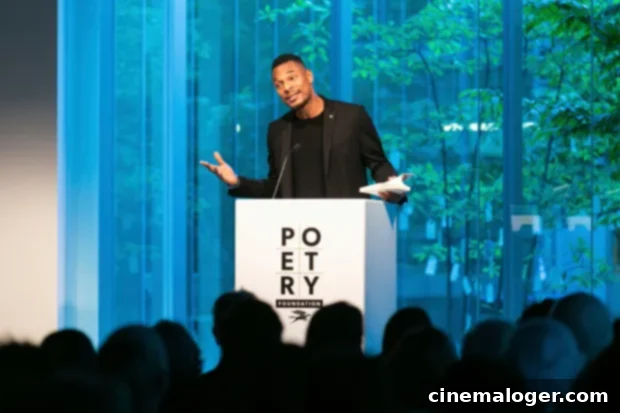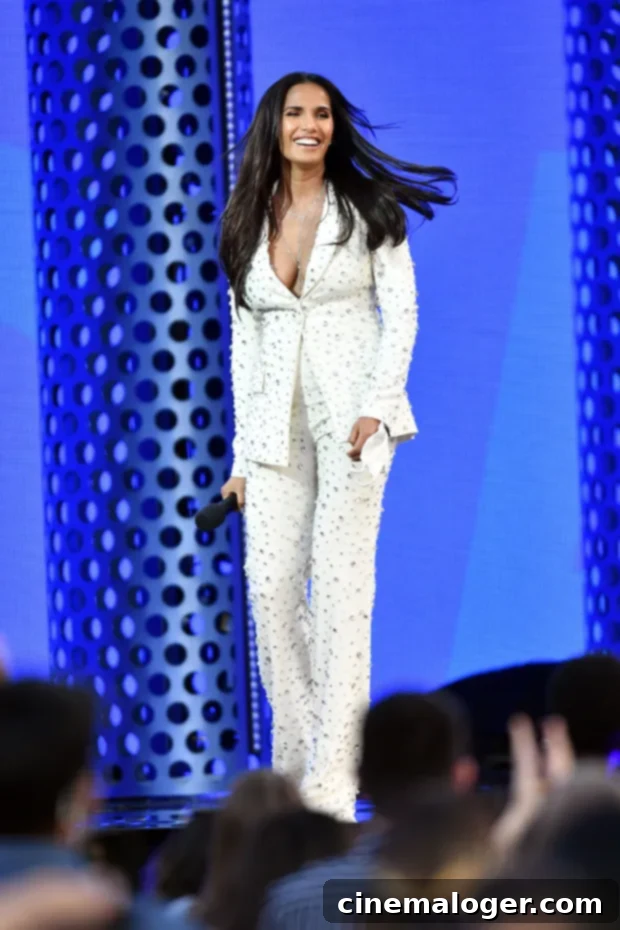Padma Lakshmi’s New Chapter: A Deep Dive into Award-Winning Poet Terrance Hayes
Television host and cookbook author Padma Lakshmi, renowned for her role on ‘Top Chef,’ has recently stepped into the spotlight with a new romance, sparking significant interest among fans and the media. Lakshmi, 50, has been spotted sharing tender moments with acclaimed poet Terrance Hayes, signaling a fresh and exciting chapter in her personal life. The couple was photographed kissing and holding hands in New York City on a Monday evening (June 14), while walking Lakshmi’s beloved dog, Divina. The sighting, initially reported by *People*, showed Padma elegant in a white summer dress and wedge sandals, while Hayes, 49, opted for a relaxed ensemble of a black t-shirt and jeans. This public display of affection confirms a blossoming relationship, coming after reports of Padma’s amicable split from venture capitalist Adam Dell earlier this year, with whom she shares an 11-year-old daughter, Krishna Thea.
As curiosity builds around Padma’s new partner, the literary world already knows Terrance Hayes as a formidable and celebrated voice in contemporary American poetry. His intellectual depth and artistic prowess make him a compelling figure, and his emergence into the public eye alongside Padma Lakshmi presents an intriguing blend of culinary and literary eminence. This article delves into the life and achievements of Terrance Hayes, exploring his distinguished career, personal insights, and multifaceted identity that have shaped him into the remarkable individual he is today.

1. Terrance Hayes Is an Internationally Recognized Poet and Educator
Terrance Hayes, born in Columbia, South Carolina, is an immensely respected and award-winning poet and educator, celebrated for his profound contributions to American literature. With a career spanning decades, Hayes has captivated critics and readers alike with his innovative style, intellectual rigor, and poignant exploration of identity, race, and culture. By 2021, his impressive bibliography included seven poetry collections, each receiving significant critical acclaim. Among these, *Muscular Music* (1999) marked his powerful debut, establishing him as a distinctive voice in contemporary poetry. He continued to build on this success with *Wind In a Box* (2006) and most notably, *Lighthead* (2010), which earned him the prestigious National Book Award for Poetry. This accolade is one of the highest honors in American literature, solidifying his status as a leading literary figure.
Beyond the National Book Award, Hayes’s work has been consistently recognized with numerous other significant honors. His official website details a remarkable list of achievements, including the Poetry Foundation’s 2019 Pegasus Award for Poetry Criticism, which honors outstanding critical writing about poetry. He also received the Hurston/Wright 2019 Award for Poetry, celebrating literary excellence by Black writers. In 2018, he was awarded the Kingsley Tufts Poetry Award, one of the largest and most distinguished prizes for a mid-career poet in the United States. These awards collectively highlight his consistent excellence and profound impact on the literary landscape, demonstrating his ability to produce work that is both critically engaging and deeply resonant.
In addition to his prolific writing career, Terrance Hayes has dedicated a substantial part of his professional life to academia, sharing his insights and passion for poetry with future generations of writers. According to the Poetry Foundation, he has held teaching positions at several prominent institutions, including Carnegie Mellon University, the University of Alabama, and the University of Pittsburgh. His commitment to literary education continues in his current role as a professor of English at New York University, a prestigious appointment that underscores his influence and expertise within the academic community. Through his teaching, Hayes inspires and mentors aspiring poets, helping to shape the future of American poetry while continuing to enrich the literary world with his own powerful and thought-provoking verse.
2. Terrance Hayes Is a Dedicated Father Who Values Artistic Legacy
Terrance Hayes is not only a celebrated poet but also a devoted father, an aspect of his life that deeply influences his artistic philosophy and personal values. He was previously married to Yona Harvey, an accomplished poet and a professor at the University of Pittsburgh. Together, they share two children, for whom Hayes harbors a profound desire to leave a legacy far richer than material wealth. This sentiment was eloquently expressed in a 2018 interview with *Poets & Writers*, where he articulated his aspiration: “This is why I just want to leave my kids my poems. I want to leave them art…Money is nothing to be governed by, because once you get it, it’s never enough.”
This powerful statement reveals Hayes’s perspective on what truly holds value and endures beyond a lifetime. He believes that art, particularly his poetry, represents a more significant and lasting inheritance than financial assets. His hope is that his children will find enduring worth and meaning in his creative output, recognizing the dedication, passion, and spirit embedded within his verses. “When I die,” he continued, “I want my kids to have my art. Surely that will be worth something one day.” This reflects a deep commitment to his craft and a belief in the inherent power and timelessness of artistic expression.
Hayes’s emphasis on leaving an artistic legacy rather than a purely monetary one highlights his conviction that creativity and intellectual contribution are paramount. It speaks to his understanding of art as a form of spiritual and cultural wealth, capable of inspiring, comforting, and challenging future generations. For his children, this legacy of poetry offers not just a collection of words, but a window into their father’s mind, his struggles, triumphs, and profound observations of the world. It’s a testament to his values as both an artist and a parent, prioritizing the richness of human experience and the power of language to connect and transform.

3. From Basketball Court to Poetic Verse: Terrance Hayes’s Collegiate Journey
Before his acclaimed career as a poet, Terrance Hayes pursued a different path during his college years, one rooted in athletics. He attended Coker College on a full scholarship for basketball, an experience he openly discussed with *Literary Hub*. “Yeah, a full ride. In basketball,” he confirmed, detailing his early athletic endeavors. Hayes clarified that while he was a competent player, Division I basketball was not his forte, primarily due to his height. “I couldn’t do Division I, because I would have been a guard, and because I’ve been this tall since I was fifteen, I’ve always played inside, so I never really learned how to handle the ball.” This background in team sports provided him with a unique foundation, fostering discipline, strategic thinking, and the pursuit of excellence—qualities that would later serve him well in his artistic pursuits.
During his time at Coker College, Hayes majored in fine arts. His initial career aspirations were somewhat pragmatic and rooted in the limited professional examples he had encountered. “I didn’t really know any college graduates other than my teachers,” he told *LitHub*. “I thought, maybe I’ll teach, and if I didn’t teach, maybe I’ll go work in the prison.” This candid reflection highlights the societal and economic realities that often shape early career choices, particularly for individuals from diverse backgrounds. However, his journey took a pivotal turn when he enrolled in an Intro to Creative Writing course, a decision that would ultimately redirect his life’s trajectory.
It was in this creative writing class that Terrance Hayes found an unexpected and profound mentor in his professor, Jack French. French recognized Hayes’s burgeoning talent and provided him with extraordinary encouragement. In a truly remarkable anecdote, Hayes recounted, “His name was Jack French, and he actually called up Maya Angelou for me when he was trying to convince me that I could do this.” This extraordinary gesture, linking an emerging writer with one of America’s most revered literary figures, served as a powerful affirmation of Hayes’s poetic potential. It was a moment that not only bolstered his confidence but also cemented his commitment to writing. Following his graduation from Coker, Hayes further honed his craft by attending the University of Pittsburgh’s distinguished writing program, where he earned his Master of Fine Arts (MFA). This academic pursuit solidified his foundations in poetry, transforming his innate talent into a highly refined and critically celebrated artistic voice.
4. Terrance Hayes Bridging Divides: The Value of Both Shakespeare and Contemporary Culture
Terrance Hayes distinguishes himself not only through his extraordinary poetic skill but also through his refreshingly inclusive perspective on art and culture. Unlike some artists who might draw strict lines between “high” and “low” art, Hayes champions a well-rounded and expansive media diet, firmly believing that artistic value can be found across a vast spectrum of human expression. This philosophy was notably highlighted during a discussion with *Literary Hub*, where he addressed the ongoing debates surrounding traditional curricula in academia.
He referenced an incident at Yale where students protested the perceived overemphasis on “all these white guys” like Shakespeare. Hayes, with characteristic nuance, commented on how an article had connected his work to the Bard: “I know because an article came back to me that said, ‘You should read Shakespeare and Terrance Hayes.’ I agree with that, and I don’t see why it can’t be both.” This statement encapsulates his belief in the power of juxtaposition and the enrichment that comes from embracing diverse literary and cultural traditions simultaneously. For Hayes, the canon is not a static entity but a dynamic conversation, one that is enhanced by a multitude of voices and influences.
His approach extends deeply into his teaching methodology, where he actively seeks to bridge these perceived divides. “I’m interested in Shakespeare, but especially how Shakespeare is in conversation with *Scooby-Doo* or *The Walking Dead*,” he explained, demonstrating his ability to draw profound connections between seemingly disparate cultural artifacts. As an educator, Hayes finds it crucial to meet students where they are, utilizing familiar popular culture references to illuminate complex literary concepts. He recounted a Q&A session where he effortlessly bounced between *The Simpsons* and Picasso, explaining his pedagogical strategy: “It was a room of low-residency MFA people in Tampa, and I said, ‘Half of you are going to get what I say about abstract expressionism, cubism, Rothko, and Picasso, and half of you are going to get *The Simpsons*, Lil’ Wayne, and Future…’ Why do I have to separate those out?” This rhetorical question underpins his conviction that all forms of creative expression contribute to a richer understanding of the human condition. By integrating hip-hop artists like Lil’ Wayne and Future alongside classical painters and revered playwrights, Hayes effectively dismantles hierarchical notions of culture, advocating for an inclusive appreciation that mirrors the multifaceted reality of contemporary life. This broad perspective not only makes his work and teaching more accessible but also reinforces the idea that true artistic insight can emerge from anywhere.

5. Terrance Hayes: A Poet Who Embodies and Embraces Multitudes
Terrance Hayes firmly believes that identity is not a singular, fixed entity but rather a complex tapestry woven from a multitude of experiences and attributes. This philosophy is evident in his refusal to be confined by reductive labels, a stance he powerfully articulated in an interview with *Literary Hub*. “I don’t think anybody is just a poet with no adjectives,” he stated, challenging the notion of a simplistic, unadorned artistic identity. For Hayes, a person’s identity is rich precisely because of its many facets, and he celebrates this inherent complexity in himself and others.
He elaborates on this point by openly embracing a diverse array of descriptors for himself, showcasing the various lenses through which he perceives his own existence and through which his work can be understood. “I wouldn’t limit it there: I would say, yes, I’m African-American; yes, I’m Southern; yes, I’m male; yes, I’m hip-hop; yes, I’m neurotic; yes, I’m a bastard poet. It’s all these other things, and the more, the better,” he proclaimed. This enumeration is not merely a list but an affirmation of the interconnectedness and co-existence of these varied elements within his persona. Each adjective contributes to the fullness of who he is, and collectively, they inform the depth and breadth of his poetic voice.
Crucially, Hayes also acknowledges the dynamic nature of these identities, recognizing that their prominence can shift depending on context and personal experience. “The order of those things shifts depending on where I am that day: some days, I’m a male poet first, and that’s what’s really going to inform the work; a lot of days, I’m a black poet first, and that’s what’s going to inform it,” he explained. This fluid understanding of self highlights his adaptability and responsiveness to the nuances of life. It demonstrates his commitment to authenticity, allowing different aspects of his identity to take precedence as they resonate most strongly with his current insights and creative impulses. Ultimately, Terrance Hayes’s powerful declaration, “But I don’t want to be tied to one adjective,” serves as a testament to his expansive spirit and his belief in the profound richness that arises from embracing all the beautiful, complex, and sometimes contradictory aspects of one’s being. This embrace of multitudes is not just a personal philosophy but a cornerstone of his artistry, allowing his poetry to explore a vast and intricate landscape of human experience with unparalleled depth and nuance.
As Padma Lakshmi embarks on this new romantic journey with Terrance Hayes, the public gains a glimpse into the life of a truly remarkable individual. Hayes is not just an award-winning poet, but a thoughtful educator, a dedicated father, and a man who effortlessly bridges cultural divides, seeing value in all forms of expression. His journey from a basketball scholarship to becoming one of the most respected voices in contemporary poetry is a testament to his talent, perseverance, and profound intellectual curiosity. This pairing of two accomplished figures from different yet equally rich worlds promises an exciting and inspiring new chapter for both Padma and Terrance, underscoring the idea that love, like art, knows no single definition or boundary.
